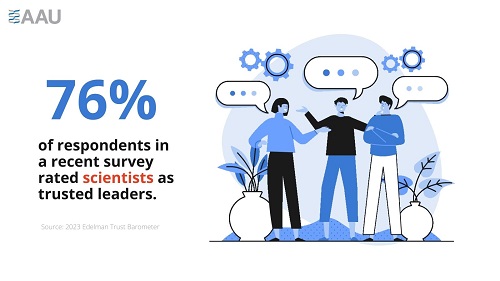 AAU Hosts Workshop on Doctoral Mentorship
AAU Hosts Workshop on Doctoral Mentorship
Last week, AAU, in collaboration with the National Academies of Sciences, Engineering, and Medicine; the Center for the Improvement of Mentored Experiences in Research at the University of Wisconsin-Madison; Duke University; and the University of Southern California Equity in Graduate Education Resource Center, hosted a workshop on “Taking Doctoral Mentorship Seriously: Institutional Design for Equity and Inclusive Excellence.” The Alfred P. Sloan Foundation provided support for the workshop.
The workshop brought together almost 50 leaders in higher education to discuss the future of doctoral mentorship, which is crucial to the professional development and success of students in graduate programs. The group specifically focused on determining how research universities can encourage individuals and academic units to implement high-quality and equitable mentorship practices. The workshop built on NASEM’s report on Graduate STEM Education for the 21st Century and the work being done as part of AAU’s PhD Education Initiative and the Sloan Foundation’s University Centers of Exemplary Mentoring.
The workshop began with a keynote fireside chat with University of Maryland professor and Dean of the College of Education Kimberly A. Griffin about equity-minded mentoring and building institutional structures for advancing mentoring relationships. On the second day of the workshop, participants discussed strategies and approaches that could yield high-quality and equitable mentorship for doctoral students. The results from this workshop will help inform a new Roundtable on Mentorship, Well-being, and Professional Development at NASEM; a report outlining outcomes from the workshop will also be available soon.
President Snyder Participates in Panel Discussion on Boyer 2030 Commission Report
Earlier this month, AAU President Barbara R. Snyder participated in a panel discussion on the Boyer 2030 Commission report, The Equity/Excellence Imperative: A 2030 Blueprint for Undergraduate Education at U.S. Research Universities, at the American Association of Colleges and Universities’ Presidents’ Trust Symposium in San Francisco. She was joined by two members of the commission: Teagle Foundation President Andrew Delbanco and Stanford University Emeritus Lucie Stern Professor in the Social Sciences Claude Steele; AAC&U President Lynn Pasquerella served as the moderator.
The conversation primarily focused on the impetus behind the Boyer 2030 Commission, which, like its predecessor commission in 1998 was tasked with examining ways to improve undergraduate education at America’s research universities. The recent panel discussion noted how the newest Boyer Commission’s recommendations can help university and higher education leaders address persistent equity gaps in undergraduate educational outcomes. The panel also discussed the current state of humanities education; how to create the right conditions for diversity to work and be successful; and the links between equity, access, and excellence.
 FEATURED RESOURCE: The Chronicle of Higher Education: Universities Can’t Do Everything: They’re Pulled in Many Directions. A Refocus on Teaching Is in Order.
FEATURED RESOURCE: The Chronicle of Higher Education: Universities Can’t Do Everything: They’re Pulled in Many Directions. A Refocus on Teaching Is in Order.
 NSF and DOE Pledge to Expand Collaboration on Scientific and Engineering Research
NSF and DOE Pledge to Expand Collaboration on Scientific and Engineering Research
Last week, the National Science Foundation and the Department of Energy Office of Science signed a memorandum of understanding to expand collaboration between the two agencies in the areas of scientific and engineering research. The NSF is a major source of federal funding for basic research in science and engineering at research universities; the DOE Office of Science supports research in the physical sciences, especially research on clean energy and decarbonization.
NSF Director Sethuraman Panchanathan said that the agreement will enable the two agencies to “scale up their impact by leveraging each other’s investments to accelerate discovery and innovation.” DOE Office of Science Director Asmeret Asefaw Berhe said that the partnership would help “grow U.S. leadership in science and technology” and allow the agencies to meet “current and future scientific challenges.” According to the NSF, the agreement builds upon previous partnerships between the two agencies and provides new “opportunities for collaboration on biotechnology, quantum information science and engineering, artificial intelligence and machine learning.”
No Leading Research Universities Report Next Week
The Leading Research Universities Report will take a break from publication next week due to an AAU all-staff retreat. We will return on Monday, February 13.
News of Interest
The Roanoke Times: UVA Unveils Plans for New $300 Million Biotech Institute – The University of Virginia is building a new $300 million biotechnology institute to develop and deliver life-saving innovative treatments while encouraging entrepreneurship and job creation. According to the university, the Paul and Diane Manning Institute of Biotechnology is getting off the ground with a $100 million gift from Paul and Diane Manning, $50 million from the Commonwealth of Virginia, and $150 million from the university itself.
The Washington Post: Major Medical Schools Join Widening Revolt Against U.S. News Rankings – Medical schools at Harvard University, the University of Pennsylvania, Columbia University, and Stanford University have all announced recently that they are withdrawing from the U.S. News & World Report rankings of top medical schools. Critics of the rankings say that their narrow criteria and rigid focus on metrics and high scores for admitted students are contrary to the schools’ missions.
NPR: Agricultural Research Funding Is Down, Impacting Fight Against Climate Change – Federal funding for agricultural research has fallen significantly over the past few decades and currently stands at 1970s levels even as both China and Brazil have increased support for research in this area. The decline in funding, according to NPR, “has implications for agriculture’s ability to adapt to climate change.”
Inside Higher Ed: State Budgets Are Booming: How Will Higher Ed Fare? – With many states flush with budget surpluses, public institutions of higher education are hoping for much-needed increases in funding. However, in some states, political considerations and fears of an economic downturn stand in the way. In other states, lawmakers are seeking new approaches that tie funding increases to programs that prepare students for the workforce.
The Cap Times: UW-Madison Launches New Center to Confront Its History of Exclusion – The University of Wisconsin-Madison is launching a new center to explore and educate the public about the university’s history of exclusion and racism. The Rebecca M. Blank Center for Campus History, named after the university’s former chancellor, will launch this summer.
Featured Research

Using Fungi, Researchers
Convert Ocean Plastic into
Ingredients for Drug Industry
Researchers from the University of Kansas and the University of Southern California are working on a process that breaks down harmful ocean plastic using chemicals into long chains of carbon atoms that are then fed to fungi. The fungi metabolize the atom chains to create commercially viable “pharmacologically active compounds” that can be used to make pharmaceutical products.

Team Projects Two
Out of Three Glaciers
Could Be Lost by 2100
A researcher at Carnegie Mellon University has led an international effort to project “glacier mass loss through the century under different emissions scenarios.” The project showed “that the world could lose as much as 41% of its total glacier mass this century – or as little as 26% - depending on today’s climate change mitigation efforts.”
Stat of the Week

Scientists Among the Most Trusted Leaders
The 2023 Edelman Trust Barometer online survey asked a global sample of respondents to indicate their level of trust in a “group of people to do what is right.” Seventy-six percent of respondents in the survey said they trusted scientists to do what is right. Scientists were the highest rated among all groups, including government leaders (47%), journalists (47%), and CEOs (48%).